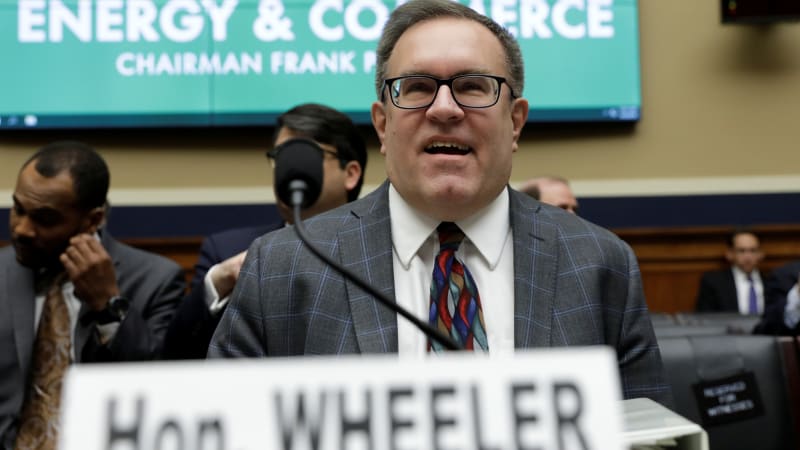Lawmakers spar over Trump plan to freeze fuel efficiency rules
http://bit.ly/2N0xVKD

WASHINGTON — Trump administration officials at a congressional hearing on Thursday defended their controversial proposal to freeze fuel efficiency requirements at 2020 levels through 2026, a plan opposed by automakers and Democrats.
The hearing comes as the administration prepares in the coming months to finalize a dramatic rewrite of fuel efficiency standards through 2026 and strip California of the right to set its own vehicle emissions rules.
The final regulation potentially faces a multi-year legal battle that could leave automakers in limbo about future emissions and fuel efficiency requirements and could decrease the number of U.S. electric vehicles offered by automakers for sale.
At a joint hearing of two House Energy and Commerce subcommittees, Democrats cast the administration plan as a blow against efforts to combat climate change and as a boon for oil companies.
The Trump administration plan aims to roll back emission standards set by former President Barack Obama. The Obama administration said a dramatic jump in fuel efficiency requirements was a key part of its climate agenda and would save motorists $1.7 trillion in fuel costs over the life of the vehicles, but cost the auto industry about $200 billion over 13 years.
Trump administration officials argued that its plan will save lives because it will reduce the forecasted cost of new vehicles and prod more people to sell older less safe models. Environmentalists and others disagree with that analysis.
Representative Frank Pallone, who chairs the Energy and Commerce Committee, said the Obama standards was “our single most important action taken to combat climate change, and a key part of our commitment to the Paris Agreement. So, naturally, the Trump Administration is trying to gut those standards as part of its reckless anti-climate agenda.”
‘WE LIKE BIG THINGS’
Transportation accounts for 30% of U.S. greenhouse emissions and light cars and trucks account for 60% of that figure.
Republicans cast the issue as one that divides rural areas that used more trucks from urban areas that are more likely to buy electric vehicles.
“We like big things. We like big trucks. We like big engines,” said Representative John Shimkus, an Illinois Republican. “We like to haul trailers… to haul horses and feed and hay and all those things that have to happen in rural America.”
The Obama-era rules called for a fleetwide fuel efficiency average of 46.7 miles per gallon by 2026, compared with 37 mpg under the Trump administration’s preferred option unveiled in August 2018.
Environmental Protection Agency Administrator Andrew Wheeler said in a letter to lawmakers on Thursday that California did not negotiate in good faith and the only counterproposal offered was to extend compliance by one year. He also said the proposal was made without consent of the state’s governor or other officials.
Mary Nichols, who heads the California Air Resources Board, will also testify on Thursday. The Trump proposal will cost Americans millions in fuel costs, kill jobs, add smog, undermine the auto industry and worsen the climate crisis, according to her written testimony.
“We have been open to accommodations that would adjust compliance timing and flexibility, that would create new paths to promote innovative technologies and zero emission vehicles, and that would benefit the public,” she said.
Deputy National Highway Traffic Safety Administrator Heidi King told lawmakers on Thursday that the Obama plan was not feasible because of changes in gas prices and a shift to larger vehicles by more U.S. buyers.
California and 17 other states have vowed to sue to block any freeze of the emissions requirements.
Earlier this month, 17 major automakers including General Motors Co, Volkswagen AG and Toyota Motor Corp, urged the White House to resume talks with California to avoid a lengthy legal battle. Automakers back a compromise, warning that the lack of a deal could lead to “an extended period of litigation and instability.”
The carmakers urged a compromise “midway” between the Obama-era standards that require annual decreases of about 5% in emissions and the Trump administration’s proposal. Reuters reported in April that officials expect the final rule will include a small increase in the yearly fuel efficiency requirements.
Representative Debbie Dingell, a Michigan Democrat in a district with many auto plants, implored officials to return to the bargaining table with California. “I am really not interested in a pissing contest between California and this administration,” she the officials at the hearing.
King was skeptical of that idea. “I don’t know whether that would achieve the goal,” she told Dingell. (Reporting by David Shepardson; Editing by Bill Berkrot)
Auto Blog
via Autoblog http://bit.ly/1afPJWx
June 20, 2019 at 04:26PM
